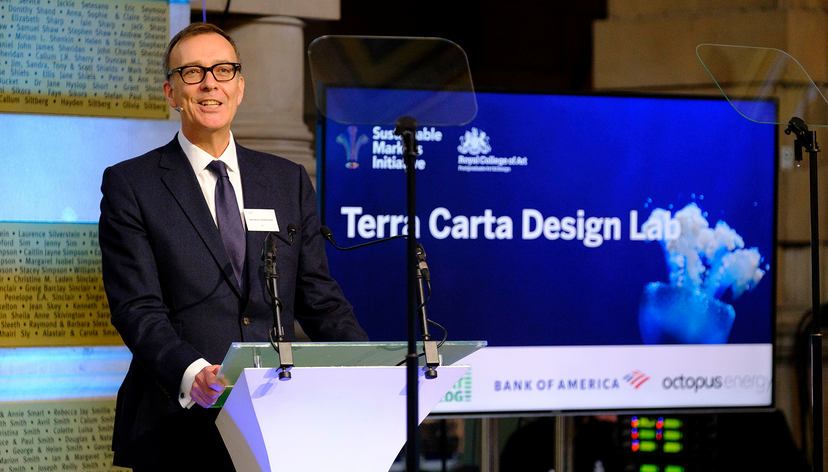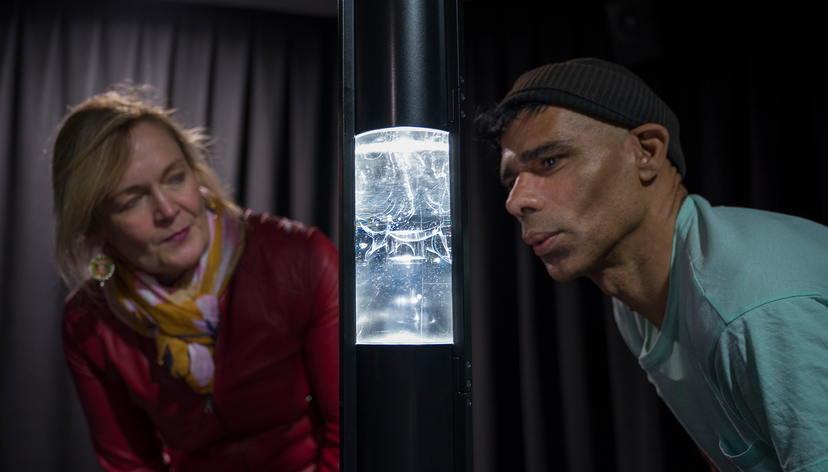
Key details
Date
- 29 November 2023
Author
- RCA
Read time
- 3 minutes
Six innovative projects from recent RCA alumni, students and staff will be showcased in Dubai during COP28 (the 2023 United Nations Climate Change Conference).
From new carbon-negative building materials to immersive data-driven experiences – each project demonstrates the real impact art and design can have on our environment.
Key details
Date
- 29 November 2023
Author
- RCA
Read time
- 3 minutes
Carbon Cell by Ori Blich, Elizabeth Lee, Eden Harrison, Juan Ignacio Rion (MA/MSc Innovation Design Engineering, 2023)

“Our team's mission is to revolutionise packaging materials, making them not only sustainable but actively beneficial for the environment.”
The Carbon Cell team from our MA/MSc Innovation Design Engineering want to make Expanded Polystyrene (EPS) waste a thing of the past. By 2024 the world is expected to produce enough to fill 2.5 million semi-trucks annually, taking hundreds of years to degrade.
Carbon Cell is a new material that can be made from things as common as waste potatoes or textiles, which aims to replace petrochemical foams with its multiple uses and thermal conductivity. A tonne of Carbon Cell biochar can capture and store up to 3.6 tonnes of CO2 instead of releasing it into the environment – and it's fully biodegradable.
Unify by Marta Suslow, Sujeet Kumar, Kazuhiro Naito, Yashasri Sadagopan, Madhurya Katragadda (MA Service Design, 2023)

“Our recognition from UN Habitat validates the urgency of our mission. We aim to empower communities and prioritize human rights in urban development.”
Unify is a service design solution to the critical issue of poor citizen engagement in smart city development. Developed by a group of MA Service Design students, the platform supports local governments to connect with external organisations or individuals who can bring specialised knowledge to the table.
Unify’s aims align with UN Sustainable Development Goals 11 and 17 – ensuring that underserved communities have a voice in decision-making. And Unify’s potential has been recognised by UN Habitat, as well as stakeholders including Nesta, local councils in London and individuals from the Chilean and Japanese governments.
AlgaeWave by Clément Bolle, Felix Ke Chen, Bingqin Yang and Feiyang Xia (MA/MSc Innovation Design Engineering, 2023)

AlgaeWave introduces a groundbreaking closed-loop system transforming noise pollution into a tool for microalgae growth. Its design comprises an aluminium tweeter, a glass resonator with steel alloy strings tuned at 400Hz, and a T-shaped connector.
AlgaeWave increases biomass production by 30% and reduces costs by 27%. And its modular design ensures easy installation. The technology is intended to enhance the sustainability of applications in biofuels, biopharmaceuticals and food production.
RootLink by Wei Zhang (MA/MSc Global Innovation Design, 2023)

“RootLink envisions a future where our urban structures are not just sustainable but alive, contributing to a healthier planet.”
Could cities be rooted in soil? Rootlink by Wei Zhang explores the possibility of constructing buildings from self-generating living organisms from the earth like plant roots. The project asks how these elements can be used to improve architectural stability and functionality.
Wei Zhang envisions future cities where construction companies maximise on green spaces and build sustainably. The project is also a blueprint for the creation of sustainable, living architectural structures, with implications for material science and environmental conservation.
Vleur by Magdalena Garabaldi and Sabrina Tian (current MA/MSc Global Innovation Design)
Vleur is a counter-top device that nudges households to re-use the waste they produce in the kitchen. Their technology uses a combination of ultrasonic waves, maceration, and a natural scoby growth to preserve the qualities of organic materials – and produce a ready-to-use facemask.
By championing both self-care and sustainability they hope to change the way people view food waste and harness its power ‘transforming the value of everyday living and promoting a sustainable lifestyle.’
The Prototypes for Humanity Award Ceremony in the Green Zone on 2 December.

Zhei Wang, Sabrina Tian and Magdalena Garabaldi at 'Prototypes for Humanity' in Dubai
‘A Passage of Water’ by Dr Yiyun Kang (Visiting Lecturer and PhD Graduate) in collaboration with Google Arts & Culture and NASA

“It is deeply meaningful to create this new collaboration with Google Arts & Culture and NASA to underscore the importance of Earth’s freshwater.”
‘A Passage of Water’ is an immersive experience that draws on data from NASA’s satellite mission SWOT – the first global survey of Earth’s surface water launched in December 2022. Our MA Information Experience Design Visiting Lecturer, Dr Yiyun Kang partnered with Google Arts & Culture and NASA to create the experience as an online tool and physical art installation for COP28.
Using audio-visual storytelling, ‘A Passage of Water’ guides audiences through the data telling the story of the climate crisis and its impact on our freshwater supply. Yiyun hopes that by bringing the works to the official venue for climate negotiations her artwork can make a real-world impact.
'A Passage of Water' will be in the Blue Zone at COP28.

